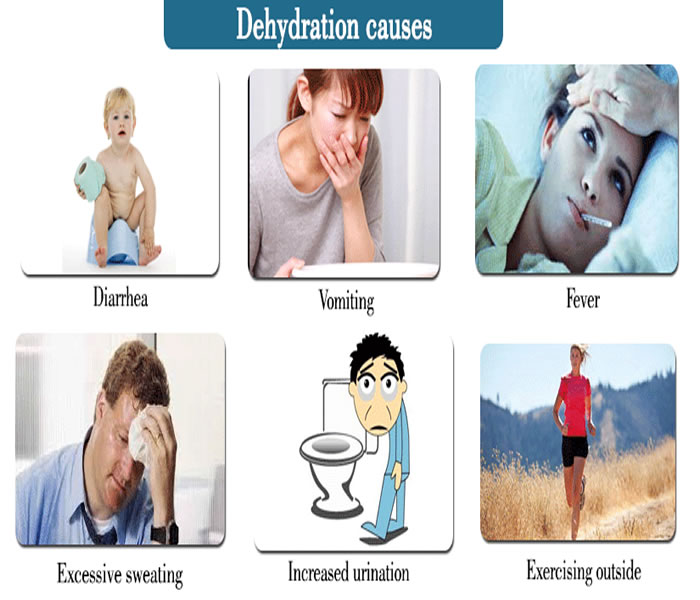DEHYDRATION
What Is Dehydration?
Dehydration is a condition that occurs when the fluid loss from the body exceeds the amount that the body takes in. Mostly water is the fluid that loss in the body that leads to dehydration with dehydration, more water is moving out of our cells and bodies than what we take in through drinking.
Most children who die from diarrhea die not because of stooling (watery poo poo) but because they do not have enough water left in their bodies. When there is no enough water in the body it lead to dehydration in turn dehydration leads to death.

Causes of Dehydration
Dehydration can happen with severe diarrhea, especially when there is vomiting too.
It can also happen in very serious illness, when a person is too sick to take much food or liquid.
Dehydration affects all ages, but it is very common especially in small children.
Symptoms/Signs of Dehydration
- Little or no urine; the urine is dark yellow
- Sudden weight loss
- Dry mouth
- Sunken, tearless eyes
- Sagging in of the ‘soft spot’in infants
- Loss of elasticity or
- Stretchiness of the skin
How to diagnose Dehydration
Mental status tests is use to evaluate whether the patient is awake, alert, and oriented.
Infants and children may appear listless and have whiny cries and decreased muscle tone.
Lift the skin between two fingers, If the skin fold does not fall right back to normal, the child is dehydrated.
Laboratory test (Blood): Blood tests is use to assess potential electrolyte abnormalities (including sodium, potassium, chloride, and carbon dioxide levels) associated with the dehydration.
Temperature may be above normal (37) which indicate fever.
How to Prevent Dehydration
When a person has watery diarrhea, act quickly:
Give lots of liquids to drink:
Rehydration Drink is best. Or give a thin cereal porridge or gruel, teas, soups, or even plain water.Give food frequently. As soon as the sick child (or adult) will accept food, give more feedings of foods he likes and accepts.
To babies, keep giving breast milk often—and before other drinks.
A special rehydration drink helps to prevent or treat dehydration, especially in cases of severe watery diarrhea.
Treatment for Dehydration
Fluid replacement is the treatment for dehydration.
Packets of Oral Rehydration Salts (ORS) are available for mixing with water in the pharmacy or chemist. These contain a simple mix of sugar, salt, citrate, zinc, and potassium.
However, homemade drinks especially cereal drinks when correctly and well prepared are often cheaper, safer, and more effective than ORS packets.
V.Important:
If dehydration gets worse or other danger signs appear, go for medicalHelp. It may be necessary to give liquid in a vein (intravenous solution).
Dehydration Home Remedies/Home Cure
Rehydration drink
/Homemade drinks

(1.) Water sugar and salt solution
1 liter of clean WATER put half of a level teaspoon of SALT and 8 level teaspoons of SUGAR.
You can take half a cup of fruit juice, coconut water, or mashed ripe banana, if available before you drink salt and water solution, this provides potassium which may help the child accept more food and drink.
NOTE:
Before adding the sugar, taste the drink and be sure it is not too salty
With powdered cereal and salt
(Powdered rice is best. Or use finely ground maize, wheat flour, sorghum, or cooked and mashed potatoes.)
In 1 liter of WATER put half a teaspoon of SALT and 8 heaping teaspoons (or 2 handfuls) of powdered CEREAL. Boil for 5 to 7 minutes to form a liquid gruel or watery porridge. Cool the Drink quickly and start giving it to the child.
NOTE:
Taste the Drink each time before you give it to be sure it is not soured. Cereal drinks can spoil in a few hours in hot weather.
Give the dehydrated person sips of this Drink every 5 minutes, day and night, until he begins to urinate normally. An adult needs 3 or more liters a day, while a small child needs at least 1 liter per day, or 1 glass cup for each watery stool. Keep giving the Drink often in small sips, even if the person vomits, not all of the drink will be vomited.
Complications of Dehydration
Very severe dehydration may cause rapid, weak pulse, fast deep breathing, fever, or seizures when a person has watery diarrhea, or diarrhea and vomiting, do not wait for signs of dehydration because it is very dangerous, it can lead to death.




